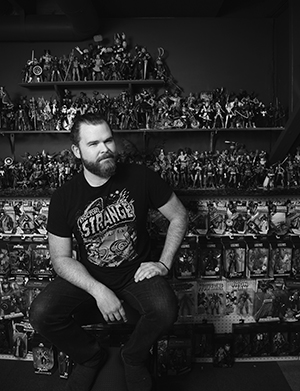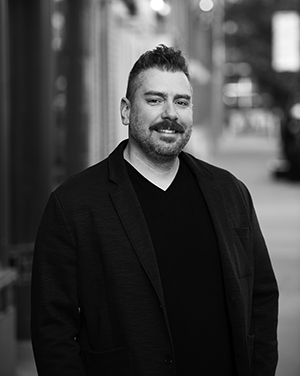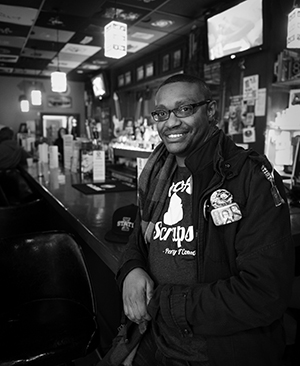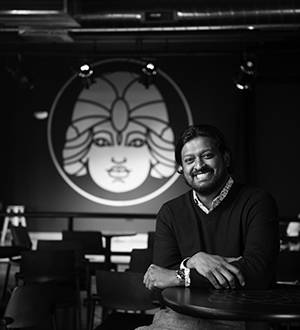Above: While Onnalee Kelley says her first love is improv, she also performs stand-up comedy, here at Lefty’s.
Editor’s Note: This story was included in the list of our favorite 2020 print stories. For reference, it was published in January 2020.
Writer: Chad Taylor
Photographer: Duane Tinkey
Sitting in the basement of his Johnston home, Dan Umthun can be a lot to take in at one time.

Blisteringly smart, he can speak with authority on a great number of things, and sound like an authority on everything else. An active member of Des Moines’ stand-up comedy scene, the 38-year-old Umthun co-hosts the weekly open mic at Lefty’s Live Music on Tuesday nights, along with Alex Carter and Toll McGrane. He’s also the driving force behind the annual Beast Village Comedy Festival and host of his own podcast—”The Doomcast”—which he regularly records out of this very basement.
While the rest of the house boasts high ceilings and an open, airy floor plan, the basement is a low-slung, effectively windowless affair. But what really sets the room apart from the rest of the house is the way it’s decorated: Everywhere—on every surface, along every wall, on every available flat space—are action figures, a dizzying array of them, drawing from nearly every possible iteration of comic book, movie, cartoon and television series. Everywhere you look, hundreds—possibly thousands—of tiny, painted eyes, arranged in neat rows, stare back at you.
It’s here, surrounded by this bacchanalia of fandom, where Umthun stands, knee-deep in half-filled gift bags for this year’s Beast Village, trying to explain comedy in Des Moines to me.
A glass of aged whiskey in his hand, he looks me in the eye.
“OK. I’m going to get unabashedly political here.”
TO BEGIN TO UNDERSTAND where stand-up comedy in Des Moines is today, it helps to have a basic understanding of where it came from.
For years if you asked local residents if they’d seen a stand-up show here, the name you heard almost exclusively was the Funny Bone. As the city’s longtime home for national touring acts, the Funny Bone often served as the entry point to comedy for many Des Moines denizens, since it was the only club bringing recognizable names to town. But if you were a comic from Des Moines, your avenues for getting to perform on the Funny Bone stage had always been limited.
Generally, a comic’s career goes something like this: Start honing your skills at open mics, progress to hosting open mics, then become an opener for local indie shows, a headliner for indie shows, an opener for national touring acts. From there, in theory, a talented comic can go in any number of ways. Some become featured comics or MCs for places like the Funny Bone. Some hit the road on touring acts of their own. Many others eventually make the move to the three comedy meccas of Chicago, New York and Los Angeles to ply their trade on bigger stages or in the writing rooms of sitcoms or late-night talk shows.
“The Des Moines comedy scene circa 2010-2012 was focused on a group of people who all had the same kind of work ethic, and the focus was really on ‘how f—ing good can we get at comedy?’ ” Umthun says. “People were calling one another out over how many open mics they were going to in a week.
“And there’s nothing wrong with that, honestly,” he adds. “But a lot of people who were doing that work at the time moved away.”
There have been clubs other than the Funny Bone throughout the years, including on-again, off-again open mics and indie comics staging one-off shows at various venues. But most everyone involved in the scene today agrees that the current atmosphere started to take shape with the launch of the Last Laugh Comedy Theater in 2014.
Opened in the former Billy Joe’s Pitcher Show space by local comic and former Second City instructor Josh Chamberlin, Last Laugh looked to bring Chicago-style improv to Des Moines, along with open mics and classes focused on helping local comedians hone their craft and find their voices.
Last Laugh closed abruptly in early 2017, but the seed it
planted took root. Now, while a fair number of Iowa-based comics still make their way to LA or Chicago to try their luck, a dedicated group of talented locals is here to stay.

been interested in stand-up, but it never crossed my mind that I’d actually do it.” Alex Carter
“GROWING UP I’D ALWAYS been interested in stand-up, but it never crossed my mind that I’d actually do it,” says Alex Carter. A Story City native, the 43-year-old Carter spent the first 15 years of his career in IT. After “completely burning out” on that track, he says he opted for a career change, turning his attention to food.
“I really got into bread baking,” he says. “Started working in some kitchens here and there and eventually landed as the pastry chef at Table 128.”
As part of his duties there, Carter was responsible for making three flavors of ice cream each week. “I got very into that,” he explains. “There weren’t really any homemade ice cream shops around, so I thought, ‘this could be a thing.’ ”
That “thing” became Black Cat Ice Cream. Plying his trade out of the walk-up window on the 15th Street side of the Gas Lamp music venue downtown, Black Cat specialized in unique flavors made by hand. He still sells ice cream online by delivery while looking for “the right space and the right opportunity” for a shop of his own.
With IT and Table 128 and great ice cream all serving as window dressing, Carter has been a stand-up comic in Des Moines since 2010.
Describing himself as an ice cream maker who tells jokes—rather than a comic who also sells ice cream—Carter started doing stand-up the same way most everyone else does: by stepping up to an open mic.
“When I went to my first one, everyone was very open and welcoming,” he recalls. “So I went and watched for a couple weeks, then I wrote a bunch of long-winded, dumb jokes and was like ‘I’m ready.’ ”
Some comics get their start with lofty goals of success. For others, it’s simply a creative outlet with a rush of adrenalin. For Carter, who knew it was never going to be a career for him, it was a stimulating mental diversion from work.
“It was like starting to solve a puzzle,” he says. “It just felt like a fun thing for my brain to work on.”
Carter, like most of the comics in town, is drawn to the camaraderie of the local stand-up community. Like any specialized activity, comedians develop kinships with fellow enthusiasts.
Stand-up comedy is a pursuit that is impossible to work on alone. You need to have some live-fire experience to improve on the nuances of timing and delivery. And for that, you’re going to have to start hitting up open mics.
LEFTY’S ON A TUESDAY night is an exercise in barely controlled chaos. As the rotating co-hosts, Umthun, Carter and Toll McGrane will take turns getting to the venue early to sign up comics and determine the order for the night. Years ago, when this particular open mic night was being held at House of Bricks in the East Village, that process might entail eight comics putting their names on a list for the chance to perform for one another and maybe one or two curious passers-by. On this particular night at Lefty’s, Carter has 36 names on slips of paper to sort through and stick to the wall in order of their slot onstage. While he does that, 30 or so people filter in and grab seats.
Open mics are, as the name implies, open to whoever wants to put their name in the hat. Each person gets five minutes to do what they want onstage. Some will be experienced comics getting in their practice reps for the week. Others are fresh-faced hopefuls, trying not to sound too much like Greg Giraldo or Patton Oswalt or whichever comic they’ve been cribbing from. Still others will be first-timers, well-lubricated with alcohol and giggling their way through whatever comes into their heads in the moment.
Even in the best of times, this can create confusion that can swing from wildly entertaining to painfully awkward. This particular Tuesday is not the best of times.
This week, Carter has brought a hazer to the bar, and each time he comes to the stage to introduce the next comic (always “a very funny guy …”) he douses the room in a liberal spray of fog. Four comics in and it’s hard to see the stage from the back of the room. After the sixth comic, Lefty’s co-owner Ann Mathey opens doors to dissipate the cloud, while Carter continues to pump out more fog.
Through it all, the parade continues. Perry Thompson tells a reworked version of a bit on dating that I’ve heard him do here before. There’s Mohamed Yual, a whippet-thin comic whose particular brand of anti-comedy is cut from the Andy Kaufman mold; I’ve seen him bring a room to tears without actually telling anything that could conventionally be classified as a joke. A drunken neophyte gets onstage and does a more-or-less rehearsed bit focused entirely around her sexual skills. Umthun follows.
“That was wild,” he says, looking around the room before entering into his own five-minute set that includes a three-minute, tightly scripted, meticulously rehearsed rant that starts on the subject of comic books and ends up serving as a primer on Libertarianism.

of an artistic person,” says Perry Thompson as he sits in Mars Cafe, munching on a muffin. “I’ve always looked for an outlet to express that creativity. I never really set out to do comedy. But I saw it and decided that I could tell some interesting stories.”
Born in Washington, D.C., Thompson moved to Iowa in 2002 to attend Iowa State. Now 35, he stays in Des Moines to be present in the life of his daughter, and got his first taste of the city’s comedy scene thanks to a Bumble pity date.
“It was December of ’14,” he recalls. “I was laying down on my couch and I get up to go to the kitchen. I start to stretch, and I get lightheaded from getting up too fast. So I fall, and [break] my jaw. I had to get my jaw wired shut the night I was supposed to have this Bumble date, and got two pity dates out of it. One of the things that we could do that wouldn’t involve a lot of talking was a comedy show.”
The show piqued his interest enough that, once he got his jaw unwired, he started attending open mics. While many beginning comics rely on one-liners or short anecdotes to get laughs, Thompson’s sets tend to be longer narratives. Many of them draw upon his experiences as an African American living in Iowa.
That perspective is what also led Thompson to create the Juneteenth Comedy Jam in 2018. “Being an Iowa comedian, there [aren’t] a lot of opportunities to do comedy in front of a black room,” he says. “It’s a very different experience, I can assure you.”
In the spring of 2018, Umthun reached out to Thompson about putting together some shows for the summer. Umthun had an open date on June 19 at Lefty’s he wanted to book, and he asked Thompson if he had any ideas for a show. Thompson certainly did.
“Now, Dan’s a white guy. And he was totally supportive, but I had to be like ‘Look, I want to do this show, but I don’t want to do it with you.’ And he still booked the show, helped get everything in place, and I love him for that,” Thompson recalls.
That initial year, everyone in Thompson’s circle came together to make the idea a reality. He had a comedian travel from California to headline, and he built a lineup entirely of black comedians. That first Juneteenth Comedy Jam had a turnout that was small, but big enough to convince Thompson that the idea was a winner. This past Juneteenth, Thompson kept the lineup all local, raised ticket prices, and drew twice as big a crowd. For year three, Thompson sees more room for growth.
“I figure that I have to go bigger,” he says. “It’s a work in progress, but what I’d like to have happen is multiple shows—maybe three different times in two or three venues.”
CALLING ON UMTHUN
for help in building a comedy festival is clearly the right thing to do. Since 2013, he’s been the motor behind the annual Beast Village Comedy Festival, held in various venues across the city. The 2019 iteration, held Oct. 3-6, featured 50 comics from across the country, including national touring headliners Matt Braunger and Megan Koester.
“It’s been an important six years,” Umthun says. “House of Bricks was still open when we started. The East Village wasn’t what it is now. It’s hard to believe that this started in a completely different political climate, in a completely different world in a lot of ways.”
For Umthun, an unabashed Libertarian and outspoken feminist, the political and intersectional drivers behind comedy and why people pursue it loom large.
“I think comedy itself is an inherently political act,” he says. “Everyone perceives themselves to be powerless in some way or another, and I think that in many ways will inform their comedy.
“And in many ways that makes comedy a great equalizer,” he continues. “Not that comedy is necessarily booked equally or is always super progressive or perfect. But you can go to an open mic your first time, and if you … are capable of writing things that make people laugh, you can seize that power right away.”
He’s right, of course. Comedy isn’t the only place in the world where the politics of power are at play, but it’s an easy place to suss it out. Early in his career, Carlos Mencia would end his racially charged sets with a challenge to his white audience: “Go to work tomorrow and try telling my jokes.”
And just as the politics of race may determine how a comedian of color will adjust their set, gender politics have their sway as well.
“Sometimes as a woman, it’s hard to say a joke because people can take things the wrong way,” says Onnalee Kelley, while waiting for an improv gig to start at Embassy Club West. “For example, I have this joke about how I started a new diet: I just eat the sugar pills out of my birth control when I’m hungry. There’s more that goes with it, but I’ve already lost people when I say, ‘I’ve started a new diet,’ because people are automatically like ‘You don’t need to be on a diet,’ you know? Meanwhile, a guy can be like ‘I didn’t get out of bed yesterday,’ and people are like ‘Yeah, that sounds about right.’ ”
While most Des Moines comics cut their teeth at open mics, Iowa native Kelley’s first taste of being funny in front of a crowd came in college, at Colgate University in New York.
An English major, Kelley took an improv class and immediately fell in love with the format. Once she moved back to Des Moines, she found Last Laugh, enrolled in some improv classes there and tried her hand at stand-up. Now, she bounces between the two, performing improv with Chowdown Comedy, and doing stand-up as, she says, “a hobby.”
“If we were playing Screw/Marry/Kill, I’d screw stand-up, because the highs are high, the lows are low and it’s a fun kind of side thing,” says the 29-year-old Kelley. “I’d marry improv because I absolutely love it to pieces and you can do it when you’re old and gray.
“I’d kill podcasts,” she adds with a shrug.
But where improv lends itself to a variety of characters and scenarios, the monologue nature of stand-up required Kelley to find one steady voice that worked for her. A tall, fresh-faced blonde, Kelley found herself stumbling against people’s perceptions not aligning with the material she was writing. Looking to develop a more disarming persona, but not wanting to play into the bubble-headed stereotype, she went with a characterization that is more subdued.
Withdrawing back into her chair and lowering her gaze to the floor, she returns to the diet joke, this time with a reedier voice that sounds like she’s been awake for two days.
“So my persona has to be a little more like this. ‘I started a new diet yesterday …,’ a bit more scared to tell everybody about it.” She sits up straight again and the force returns to her voice. “Because then people mentally approach it more like ‘Oh, this girl is being vulnerable right now; let’s listen.’ ”

SINCE LAST LAUGH CLOSED, there has been a void in the city. Places like Lefty’s and the Fourth Street Theater can host all the open mics in the world, but what Des Moines has lacked is a dedicated, midsize venue for regular comedy. Enter Sid Juwarker.
Born in India, Juwarker made his way to Iowa, by way of Singapore, in 1996 when he enrolled at Drake University, picking up a degree in environmental science. Now 41 and splitting his time working as an engineer and as an adjunct professor at Drake, Juwarker’s entry into stand-up has an old refrain to it.
“I started by taking an improv class at Last Laugh, and that became my creative outlet for a while,” he says.
“I wanted, as a brown person in Des Moines, to talk about certain aspects of race that aren’t normally discussed.
“I wanted to talk about social issues in a broader sense, where everyone in the room can laugh at the material, but you still get the point across,” he adds. “For example, I have a joke now about winning a prize at the Ankeny Chamber of Commerce’s charity golf outing. I didn’t win money, I didn’t win more golf, I won a yearlong tanning package. So I joke about the city sitting around picking prizes and thinking to themselves, ‘It’s golf. There’s no way a nonwhite person is going to win anything today.’ ”
Blessed with an abundance of charisma, Juwarker quickly made a large circle of friends inside the stand-up community. From there, as his confidence and his abilities grew, he started to identify what the community needed to grow and thrive, and where he could help fill the void.
The answer to both of those questions came in the form of Teehee’s Comedy Club.
Situated along a trendy stretch of Walnut Avenue along with Noce and Horizon Line Coffee, Teehee’s is a 3,100-square-foot space with a 100-person capacity that features curated comedy, open mics and improv classes. The club opened in November.
“I started to think that for a town to really be able to say it has a comedy scene, you have to have varying degrees of comedy that all kind of funnel into one another,” he says. “So you have your independent shows that run at Java Joes or wherever, then you have the Funny Bone, which brings in national touring acts, and then you have the superstars that fill the Civic Center. But there was no logical jump between the $5 Java Joes shows … and the national touring acts at Funny Bone. We need that middle piece.”
That middle piece is exactly what Teehee’s strives to be. With enough time, Juwarker hopes that his club will act as a kind of feeder system for the Funny Bone and beyond, giving comics who have earned their stripes doing indie shows a chance to play in front of a dedicated comedy crowd and show the Funny Bone bookers that they have the ability to open for a touring act. Additionally, Juwarker hopes that the venue’s comedy and downtown location will be a draw for mid-tier performers who don’t yet have the national name recognition to hit the Funny Bone’s radar.
“They’re all doing shows in Denver and Chicago and Kansas City and Minneapolis,” he says. “Well, to get between any of those cities, you have to pass through Des Moines. So why not break your long drive up? I’ll give you a stage to perform on, a place to sleep at night, and my whole model is based on paying comedians, not to create a venue where I’m making money on the backs of comedians’ work and the pretense of ‘exposure.’ ”
Long-term viability in a market like Des Moines will be a wait-and-see proposal for Teehee’s, but within the stand-up community, the buzz is intense.
“This is a dream for those of us doing independent comedy in Des Moines,” Carter says. “This is the first time that indie comedians have had a home [since Last Laugh]. There’s been no clubhouse.”
“That was our home,” Thompson says of Last Laugh. “What [Teehee’s] is really providing is an audience. You can do open mics and hone your craft, then go in there and really start killing. One of our own made this club.”
Open mics might lead to Teehee’s. Teehee’s might lead to the Funny Bone. But even then, the odds of that leading to a career in comedy are long, and there is no surefire path to bigger gigs or television writing jobs. But for the self-described lunatics who have chosen to do stand-up in Des Moines, moving away just to indulge in what you love is no longer the only viable option. And as long as there’s a venue with a stage and an open night of entertainment to fill, you’re going to find Kelley and Thompson and Carter and Umthun and dozens of others like them, ready to do a set.
“For people like me, it just lives in [our] system,” Carter says. “I can’t imagine not doing it.”











